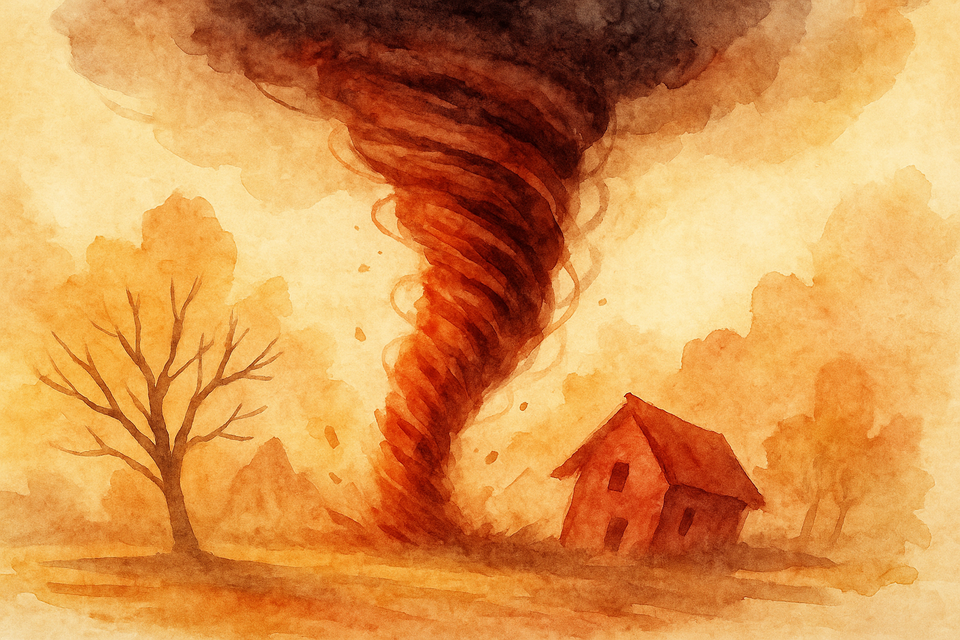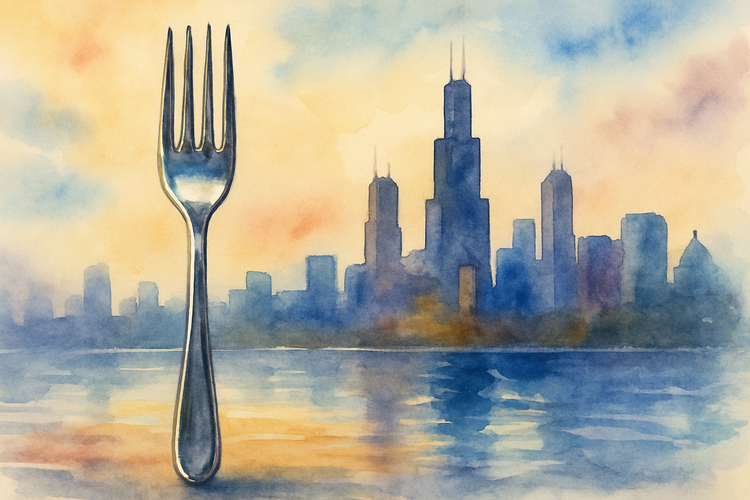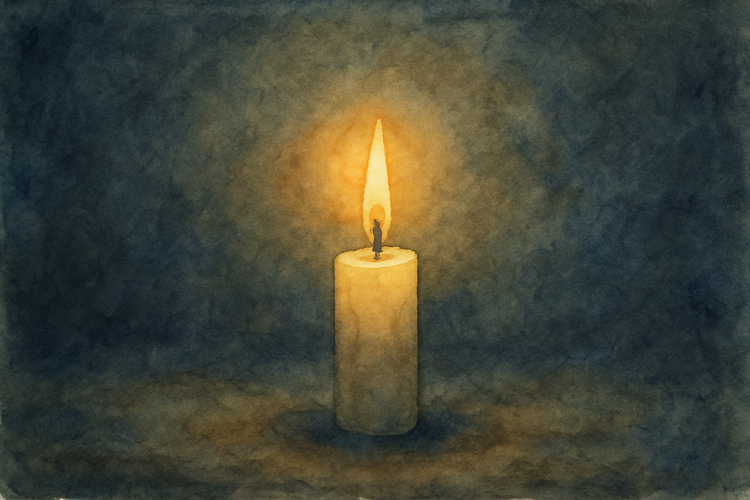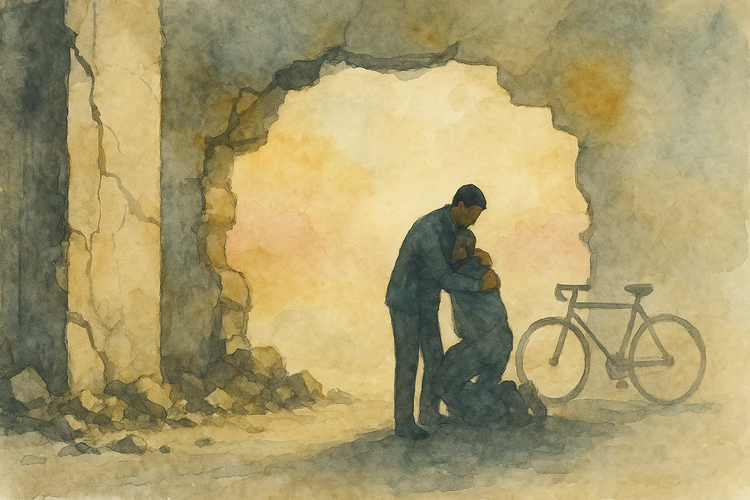The Bear S2E6 "Fishes"

Spoilers ahead for Season 2 of The Bear.
If you’ve watched “Fishes,” you already know the plot. What stays behind is something harder to name: the exhaustion, the tenderness, and the way dysfunction swallows even love. That’s what I’m writing toward here.
A House Already on Edge
The episode lifts us out of the season’s restaurant story and drops us into Christmas five years earlier, when the Berzatto family gathers under one roof. From the start, the air is heavy with tension. Natalie circles Donna with worried questions — “are you okay?” — a refrain that already feels ritualized, as if she’s been asking it all her life without ever getting a real answer. Carmy emerges soon after, drawn into the undertow before he’s even had a chance to breathe. What should be a moment of warmth at the holidays is instead a house bracing itself for impact.
When the extended family floods in — aunts, uncles, cousins, all at once — the camera makes no attempt to sort them neatly. It just hurls us into the cacophony. Conversations overlap, grievances rise to the surface, alcohol flows. The love is there, in the hugs and teasing and the shared act of gathering, but it’s already fragile, already strained. Every gesture of care is balanced on a knife’s edge, ready to tip into argument or collapse. From the very first moments, the episode makes clear: this isn’t the story of one unstable figure at the center, but of a whole family orbiting dysfunction, held together less by peace than by sheer centrifugal force.
Fits of Tenderness, Shadows of Addiction
Before the family makes it to the table, the episode splinters into smaller threads that show how deeply each member is entangled in the larger dysfunction. Richie dreams with his wife about a better life in the suburbs, only to feel his pride undercut when she thanks Jimmy for a job Richie doesn’t yet have. Jimmy’s quick lie — pretending he has given Richie work — is a kindness, but it’s also a bandage over a wound that never quite heals. The moment glimmers with love, then collapses back into insecurity.
Elsewhere, Carmy seeks Michael in the quiet of the kitchen. He offers his brother the drawing of the restaurant — the future they might build together — and Michael receives it with a mix of warmth and unbearable sadness. For a fleeting instant, love cuts through: Michael tells Carmy how much he cares, how much the gesture means. But addiction is already pulling him under. We see it in the hollowness behind his smile, in the way the moment of connection gives way to an expression of deep, unspoken despair. That sorrow will later erupt at the dinner table, but here it simmers, visible only if you know to look for it.
And at the stove, Donna works herself into a frenzy over the feast she’s producing. Her words to Carmy — “I make beautiful things for them, and no one makes beautiful things for me” — are both a confession and a manipulation. It’s love twisted by resentment, an impossible demand that her children soothe her pain even as she lashes out at them. Each of these threads carries the same rhythm: affection flares up, real and powerful, before being smothered by addiction, pride, or instability.
A Meal on the Edge of Violence
By the time the family gathers at the table, the night is already poisoned. What should be a shared ritual of food and tradition instead becomes a crucible, concentrating everything that has been simmering in the house. Conversation turns sharp, and Michael locks into combat with Lee. At first, it’s the usual family ribbing — stories told at one another’s expense — but the banter curdles quickly. Addiction gives Michael’s voice an edge he can’t control, pushing him past irritation into incoherent shouting. He throws forks, his words spilling out in a rage that is both terrifying and heartbreaking. What’s left unsaid in the quiet with Carmy earlier now erupts, raw and unfiltered, for everyone to see.
It’s only when the fight threatens to tip into outright violence that Stevie intervenes with grace. His words about the Seven Fishes as acts of love, his attempt to cast the family as bears both aggressive and tender — it’s a sincere effort to pull the night back from the brink. But really, it’s an apology disguised as prayer. The grace doesn’t calm the chaos so much as reframe it, smoothing over the dysfunction instead of naming it. For a fleeting moment, the table breathes again, but the reprieve is thin, fragile. The love he describes is there, yes — but it’s already overwhelmed by the storm raging around it.
The Powder Keg Finally Blows
The dinner never truly steadies. Even after Stevie’s grace, the tension hangs in the air, waiting for the smallest spark. It comes, fittingly, from Natalie’s repeated question — the one she’s been asking all night, the one she’s probably been asking her whole life: “Are you okay?” When she directs it at Donna once more, the fragile surface cracks.
Donna explodes, her anguish and rage pouring out in a torrent that leaves no room for comfort. It’s not just instability — it’s a lifetime of pain weaponized, turned outward at the very people who have been trying, in their broken ways, to care for her. And then she crosses the line from words to action, climbing into her car and driving it straight through the house. The metaphor of dysfunction tearing through the center of the family doesn’t remain metaphorical; it becomes literal, physical, unforgettable.
The episode ends not with reconciliation, but with wreckage. Any tenderness — Carmy’s gift to Michael, Jimmy’s lie to protect Richie, Stevie’s grace — is obliterated under the weight of addiction and volatility. The deep love is there, but it is no match for the chaos. What we are left with is the image of a family swallowed whole by its own storm.
Tornado Logic
“Fishes” doesn’t just show a dysfunctional family — it traps us inside one, forcing us to feel how love can flicker but never quite hold when addiction and anger set the terms. Every character reaches for connection: Carmy with his drawing, Richie with his pride, Natalie with her worried question, Stevie with his grace. Each attempt is swallowed, folded back into the noise, until what should have been a sacred meal becomes indistinguishable from a battleground.
The episode’s genius is that it never lets us stand outside and judge. We are pulled into the tornado with them, where dysfunction feels normal, where apologies take the shape of prayers, and where even love begins to sound like a form of denial. By the time Donna drives through the house, it doesn’t feel like a shocking twist so much as the inevitable culmination of forces that have been building all night. The destruction is literal, but the wreckage has been there from the beginning.
And it is exhausting. Watching “Fishes” is not a passive experience — it is overwhelming, almost physically draining, like being pressed against the table as the arguments and outbursts ricochet around the room. The series has always carried intensity, but here the dysfunction is so profound and so engulfing that the viewer feels tired and sore from enduring it. That exhaustion is part of the truth the episode tells: this is what it means to live inside such a storm, where even the deepest love is drowned out by the endless weight of chaos.



Comments ()